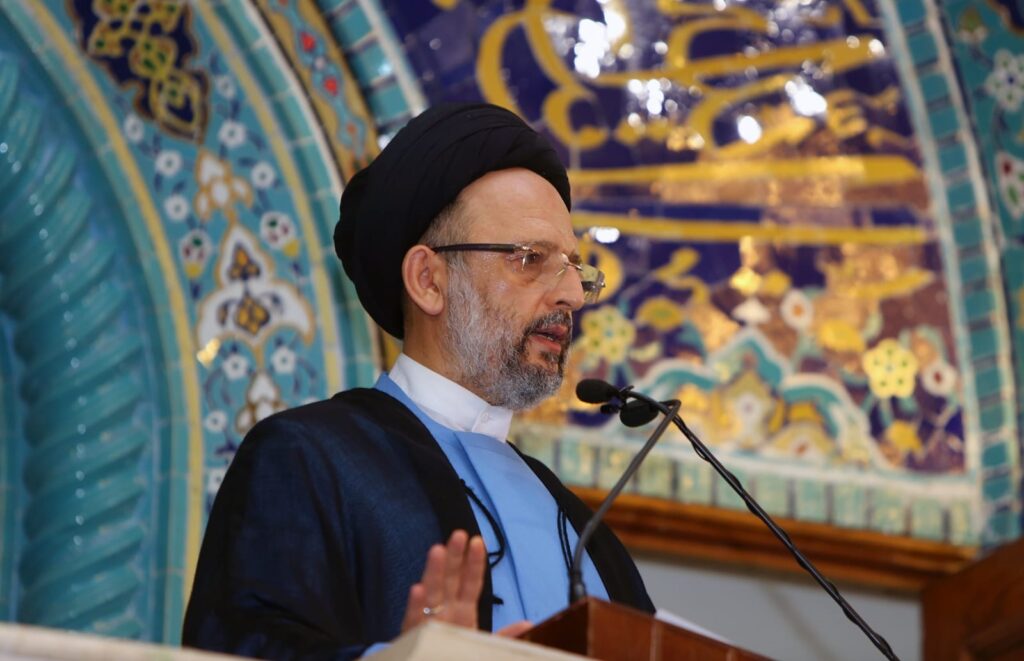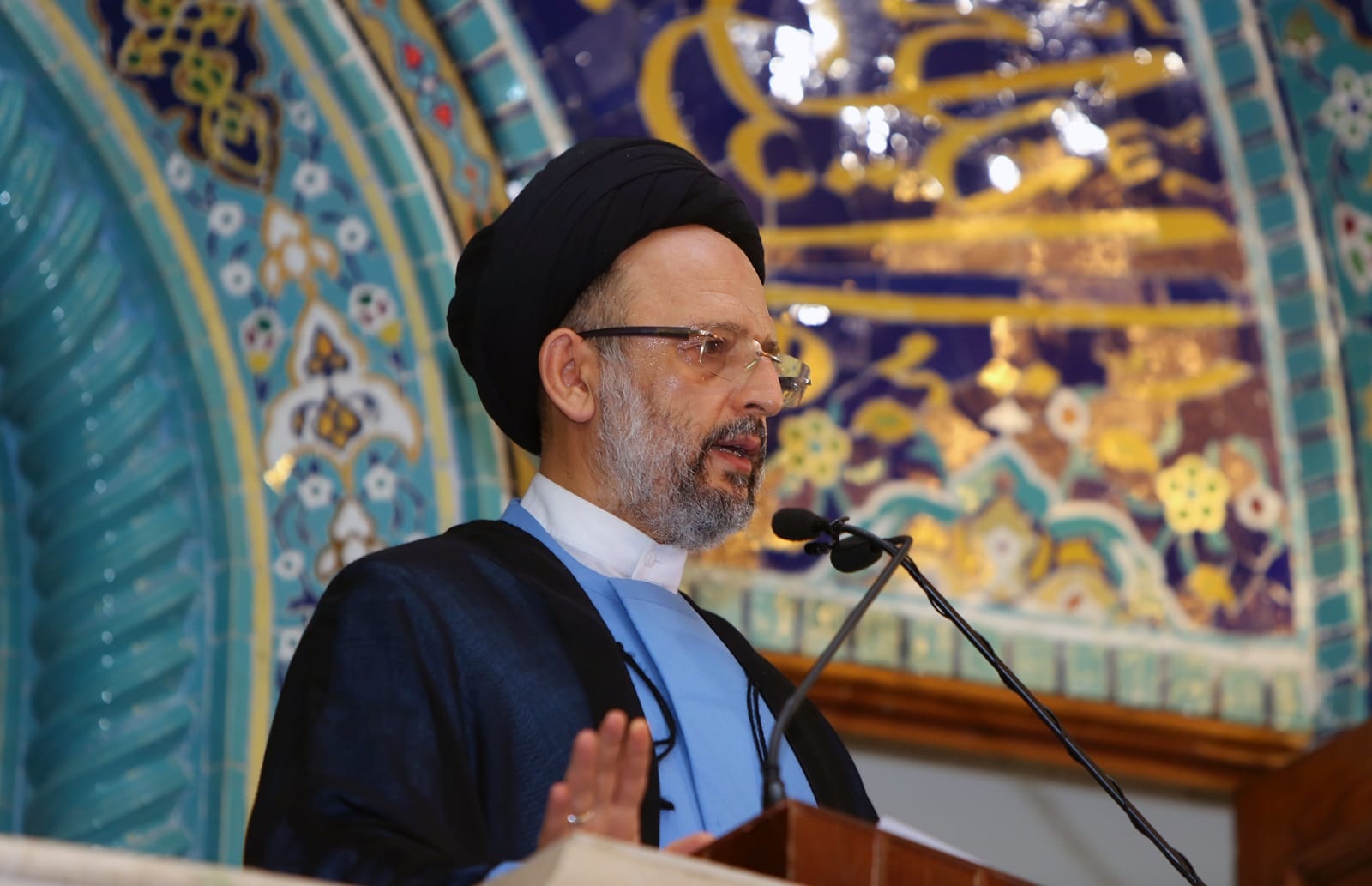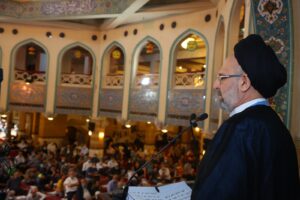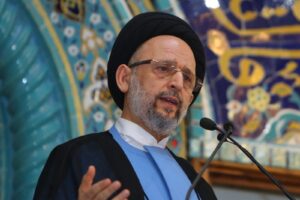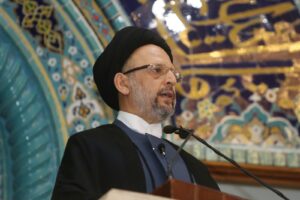In The Name of Allah, The Compassionate, The Merciful
. His Eminence, Sayyed Ali Fadlallah, delivered the two Friday prayer sermons at the Imamain Al-Hassanain Mosque, Shawal 10, 1445 /April 19, 2024. Several prominent religious scholars, dignitaries, and hundreds of believers attended the Jumu’a prayer. Following is a summary of the sermons.
The First Sermon
Allah, the Most Exalted, says in His Glorious Book: “Indeed, Allah has supported you in many battlefields and [remember] on the day of Hunayn when your great number pleased you, but it did not avail you at all, and the earth was constrained for you despite its vastness; then you turned back, fleeing. Then Allah sent down His tranquility upon His Messenger and upon the believers and sent down soldiers angels whom you did not see and punished those who disbelieved. And that is the recompense of the disbelievers.”
On the 10th of Shawwal in the 8th year after Hijra, and after thirty days from the victorious conquest of Mecca, the Battle of Hunayn took place. It was named after a valley called Hunayn, located near Mecca. This battle occurred when two tribes from Quraysh, Hawazin and Thaqif, decided to unite their efforts and build a strong unified army with the aim of reclaiming Mecca from the Muslims and stopping the spread of Islam. This decision was made as people were entering into the religion of Allah, and the Muslims became a feared force in the Arabian Peninsula.
They chose Malik ibn ‘Awf al-Nadari to lead their army, a young man known for his horsemanship and bravery. He built this army and prepared it for the decisive battle with the Messenger of Allah (p.) and the Muslims. He placed the women, children, and wealth behind his army members to motivate them to fight.
When the Messenger of Allah (p.) was informed of the movement of Malik ibn ‘Awf’s army, he quickly rallied his companions and prepared a large army of twelve thousand fighters, equipping them with sufficient weapons and gear. He decided to march towards the enemy.
This large size of the army impressed the Muslims with themselves and what they had achieved, and with the strength they had attained. One of them expressed this by saying, “If we encounter our enemies, we will not be defeated as from today…” Although the Messenger of Allah warned them not to be impressed by their strength and the number of their army or to underestimate their enemies.
Before the battle, Malik ibn ‘Awf sent three of his men to assess the situation and number of the Muslims. When they informed him of the strength and abundance of the Muslims, he decided to change his military plan. He chose not to engage directly with the Muslim army and instead use military deception. He decided to descend with his army to Hunayn and hide behind the rocks along the path the Muslims would take. They ambushed them when they arrived. As soon as they descended into the valley of Hunayn, they emerged from behind the rocks, hurling stones, spears, and arrows at the Muslims, while another group engaged them with their swords. This instilled fear in the hearts of the Muslims, causing them to flee into the valleys and mountains, leaving only few fighters with the Messenger of Allah (p.), not exceeding eighty men.
This situation was referred to by Allah in the Quran: “And the earth appeared constrained to them despite its vastness, and they turned back fleeing.”
The Messenger advanced to face Malik ibn ‘Awf’s army, while his uncle, al-‘Abbas, whose voice was loud, called out to the Muslims, urging them to return to join the Messenger of Allah (p.) and the few companions with him to continue the fight.
He called out loudly, “O people of the covenant of the tree, where are you fleeing? Where is your pledge to the Messenger of Allah (p.)?” By this, he intended to remind them of the covenant of the tree that occurred before the Treaty of Hudaybiyyah, in which the companions of the Messenger(p.) pledged to support him until death.
The cries of al-‘Abbas reached the ears of the Muslims, stirring their zeal, and they began to return to the battlefield. They came to the Messenger(p.) , saying, “Here we are, O Messenger of Allah!” They resumed the fight with the zeal of one man. It was only a matter of hours before the polytheists, led by Malik ibn ‘Awf, were defeated, and their army dispersed, leaving behind their wealth, women, and children who had accompanied them to the battlefield.
Thus, the defeat experienced by the Muslims turned into a supported victory, strengthening the foundations of Islam in the Arabian Peninsula and spreading the voice of Islam to every ear that hears and every eye that sees.
My dear brothers and sisters, the lessons of Hunayn were profound, and we need to reflect on some of them:
- The Battle of Hunayn aimed to emphasize that victory lies, in the calculations of Allah, not in the abundance of numbers and equipment, nor in their scarcity. Indeed, Allah granted victory to the Muslims at Badr despite their small numbers and lack of equipment. This is indicated by the saying of Allah: “How many a small company has overcome a large company by permission of Allah”, and He said: “And Allah had certainly supported you at [the battle of] Badr when you were few in number“. Conversely, the Muslims faced defeat at the beginning of their battle with the polytheists at Hunayn despite the abundance of their numbers and equipment. Victory does not come for free but by fulfilling its conditions as called upon by Allah for the believers. He promised them victory if they fought in His cause: “If you support Allah, He will support you and plant firmly your feet]. They did not harbor love for the worldly life in their hearts; they were willing to sacrifice for His sake, prepared for war with whatever strength they could muster, coupled with good planning and proper battle management, strict adherence to combat standards, and avoiding arrogance and underestimation of the enemy.
- This battle indicated the danger of self-admiration or pride in one’s wealth and strength. History warns us of many nations, civilizations, and armies that fell under the influence of excessive pride in their strength. Therefore, the Hadiths warned against this vice, as it was said, “Self-admiration corrupts reason,” “Self-admiration reveals defects,” and “Whoever is overcome by self-admiration will perish.”
- Allah mentioned the blessing of tranquility and peace that He bestows upon the believers, and the guidance they receive when they show sincerity in their actions and steadfastness in the battlefield. Allah provides them with tranquility, removes fear from their hearts, and strengthens their confidence in victory.
- Despite the aggression of the enemies, the Messenger of Allah (p.) showed mercy, forgiving the captives and preventing the killing of the polytheists’ children. He reminded his companions that they were sons of non-believers, and that every newborn is born on the natural disposition of Islam before they decide otherwise.
We are in great need, facing challenges, to draw inspiration from these meanings that make us stronger, more resilient, and more capable of facing them, leading us to victory and honor. “And victory is not but from Allah.”
The second sermon
Worshippers of Allah, I advise you and advise myself
to persevere to attain what the patient are promised, as Allah Almighty indicated when He said: “And give good tidings to the patient * Who, when disaster strikes them, say, ‘Indeed we belong to Allah, and indeed to Him we will return.’ Those are the ones upon whom are blessings from their Lord and mercy. And it is those who are the [rightly] guided.”
And when He said: “And be patient. Indeed, Allah is with the patient.”
“And We made from among them leaders guiding by Our command when they were patient.”
The Hadith says: “Patience is from faith like the head is from the body.”
And in another Hadith: “Victory comes with patience, relief with affliction, and ease with hardship.”
So let us endure when we face afflictions, challenges, and crises, and there are many of them, so that we do not fall before them, be deceived, or be defeated, nor abandon our values, principles, dignity, and honor…
Let us attain what Allah promised the patient and be under Allah’s care and protection, for whoever is patient, Allah will make him victorious and better able to face challenges.
And we start with the Israeli aggression against Iran, which has shown, as expressed by one of the leaders of the entity, in the pathetic manner it occurred, to indicate the extent of weakness and frailty that the enemy is experiencing on more than one level. This was confirmed by the Iranian strike it faced earlier, which, despite all the talk about it, achieved success when it accomplished its objectives and demonstrated the capabilities possessed by the Islamic Republic. This made the enemy and its supporters think carefully before any retaliation. Then came the fragility of the Zionist response to confirm the great concern of the entity not to escalate for fear of a direct war with Iran.
This entity and its supporters felt clearly the risks they would face if they continued in their arrogance, after Iran made its decisive decision that it will no longer remain silent about any attack it faces. This was expressed by its non-silence about the attack on its consulate despite all the talk that it would swallow what happened and would not have the courage to confront the Zionist entity. It has become clear that its patience and resilience in the face of wounds were only due to its keenness on peace in this region and in this world, but it finally saw that such an approach was no longer effective against this entity and the supporters of its aggression.
Therefore, the Iranian response came to confirm, beyond any doubt, the extent of the strength that Iran has now possessed and the progress it has made in terms of military capabilities despite the siege it has been subjected to. It proved that it is capable of striking the Zionist entity in its own home, and achieving objectives it wanted despite the level of support provided to this entity by many countries and the support it received.
In the face of what has happened and what may happen, we call on the world, which supported and supports this entity, to realize the risks of continuing this support and giving it the right to do whatever it wants and however it wants, and what this may lead to in terms of risks to global peace. This requires this world to work to restrain this entity and prevent it from persisting in its aggression, which it threatened with through its war minister, when he indicated that its planes can reach anywhere in the Middle East… Because this persistence will no longer be in the interest of the enemy after it was clearly proven that there are those in this world who do not sleep on oppression, do not accept humiliation, and do not accept defeat, and that the logic of power, which is still being relied upon to subdue this region and seize its decision, is no longer effective. What is effective is respecting the rights of peoples, accepting their options , and respecting their sovereignty on their land.
We return to Gaza and its bleeding wound, where there will be no solution in the region except by stopping it, as the enemy continues to commit massacres in it, as indicated by the numbers of casualties falling daily and the mass graves that were recently discovered, while it continues to destroy every aspect of life in it, confirming its insistence on displacing the people of the sector in preparation for ending the Palestinian issue, without this entity showing any readiness or desire to comply with the United Nations decision calling for a ceasefire and reaching a solution that ends the suffering of this people through negotiations, despite all the facilitations provided by the Palestinian negotiator in this regard. We are witnessing its confirmation to continue its decision to enter Rafah as its last stronghold, which will be followed by the invasion of its army directly or through its settlers to the Palestinians in the West Bank.
We salute in the face of all this the Palestinian people and its resistance and all those who stand by its side, for what they offer every day as a model of patience, steadfastness, and confronting this entity, preventing it from achieving its goals…
And we reach Lebanon, where confrontations with this enemy have intensified, believing in supporting this cause and not leaving the Palestinian people alone. This is evidenced by the qualitative operations carried out by the Resistance, confirming that this homeland will not be an easy prey for it and that it is capable of responding to its aggression… while the threats of the enemy continue and it carries out maneuvers simulating a war on Lebanon, and continues to destroy all aspects of life in the safe villages…
Here we renew our call to the Lebanese to recognize the danger of this enemy and to listen to what this enemy says, that it will not stop its war on Lebanon if the war on Gaza stops, and not to think that they are far from its targeting, as it sees Lebanon as its opposite. This requires vigilance on internal unity and civil peace to prevent the enemy from taking advantage of any weakness on the internal front, and if there are internal disputes, they should not lead to internal tension or tamper with its civil peace or weaken Lebanon’s position against this enemy.
At the same time, we reaffirm the need to respond to all calls that want this country not to remain a vacuum after the consequences of that have become clear in terms of not addressing internal files, which it is clear will worsen, whether on the economic, living, or vital level, especially in addressing the crisis of the Syrian displacement, which has become necessary and urgent to address, given its negative repercussions on the internal situation.
We remain on the internal level, to commend the role of the security forces in their diligent work to confront the gangs of theft, which have resorted even to murder to achieve their goals and objectives, while renewing our call for justice and not holding all Syrians accountable for the consequences of what individuals among them do of crimes and that this should not be a justification for practices that harm them.
